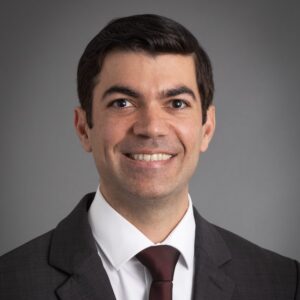 Tomas Romero, MD joined the Section of Nuclear Medicine and Molecular Imaging as an assistant professor (CHS) in August 2025.
Tomas Romero, MD joined the Section of Nuclear Medicine and Molecular Imaging as an assistant professor (CHS) in August 2025.
After earning his medical degree from the University of Zulia, Dr. Romero began his career as an emergency physician in Venezuela. Upon relocating to the United States, he transitioned to research support roles affiliated with the University of Arkansas and Baylor College of Medicine, before resuming his clinical training. He began his postgraduate education with an internship at Auxilio Mutuo Hospital in San Juan, Puerto Rico, followed by a second internship at Bella Vista Hospital in Mayagüez. In 2024, he completed his residency in Nuclear Medicine at the University of Puerto Rico and the VA Caribbean Healthcare System. He then pursued subspecialty training through a PET/Molecular Imaging fellowship at the University of Wisconsin Hospital and Clinics, which he completed in 2025.
Where are you from?
Maracaibo, Venezuela.
Why did you choose Nuclear Medicine?
I’m especially drawn to the opportunity to reveal how organs function in real time. Molecular imaging plays a vital role in clinical decision-making by identifying, localizing, and staging disease—often providing the key information needed to guide patient care. What excites me most is the ability to go beyond image interpretation and contribute directly to treatment through thyroid radioiodine therapy and the rapidly evolving field of theranostics.
What are your professional interests?
My professional interests include whole-body PET imaging because it allows us to see the entire body at once, reducing the chance of missing important areas of disease. Beyond imaging, I also focus on theranostics and how emerging radiotracers can improve diagnosis and personalize therapy.
Why did you choose to work at UW–Madison?
My fellowship experience here left a lasting impression from day one and deepened my appreciation for the institution. I’m continually inspired by the talent, professionalism, and collaborative spirit of the faculty, residents, and staff. UW–Madison is a place where coming to work is both enjoyable and intellectually stimulating. I’m proud to contribute to trainees’ education and to be part of a team that delivers high-quality diagnostic and therapeutic care in an environment that fosters innovation and puts patients first.
What are your hobbies?
Outside of work, I enjoy spending time with my wife, Kelly, and our children—whether we’re exploring the outdoors or sharing a meal with friends and family.